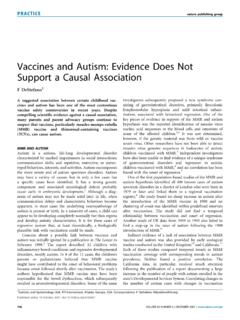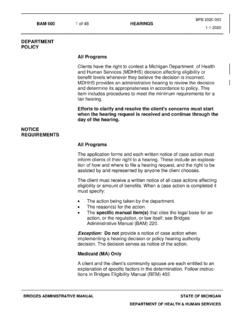Transcription of Michigan Department of Community Health - miOttawa
1 Michigan Department of Community Health 201 Townsend St, Box 30195 Lansing, MI 48909 Communicable Disease Division Immunization Division Phone: 517-335-8165 Phone: 517-335-8159 Fax: 517-335-8263 Fax: 517-335-9855 Bureau of Laboratories Phone: 517-335-8063 Fax: 517-335-9631 After hours Emergency calls only: 517-335-9030 Michigan s Communicable Disease Rules Michigan s communicable disease rules are promulgated under the authority conferred on the Department of Community Health by section 5111 of Act No. 368 of the Public Acts of 1978, as amended, being of the Michigan Compiled Laws. Violations of these laws will be reported to the state of Michigan . This guide is a synopsis of rules as of the date of issue.
2 For additional reporting requirements regarding HIV and AIDS please refer to MCL et seq. Health care professionals are advised to consult with their local Health departments or legal counsel if they have questions about their responsibilities regarding these rules. The Michigan Department of Community Health maintains, reviews and revises the list of reportable conditions located on pages 5 and 10 at least annually. Please refer to the Michigan Communicable Disease Information website at or contact the Communicable Disease Division at the number below for the most recent list. The Privacy Rule in the Health Insurance Portability and Accountability Act of 1996 (HIPAA) allows for the disclosure of protected Health information, without individual client or patient authorization, to public Health authorities, who are legally authorized to receive such reports for the purpose of preventing or controlling disease.
3 Table of Contents WHY REPORT COMMUNICABLE DISEASES?.. 1 LOCAL Health Department SYSTEM AND 2 Michigan PUBLIC Health LABORATORY 3 A. Physician or Health Care Professional Authorization to 4 B. Reporting of Suspect 4 1. Physicians and 4 2. Schools, daycares and 4 C. Physician and Authorized Health Care Professional Reporting 5 1. List of conditions to be 5 2. Reporting of conditions not 6 3. Timing of 6 4. To whom to 6 5. Content of the 7 6. Animal 8 7. Submission of post-mortem 9 D. Laboratory Reporting 10 1. List of infections to be 10 2. Reporting of infections not 11 3. Timing of 11 4. To whom to 11 5. Content of the 12 6. Mycobacterium tuberculosis complex reporting and culture 12 7.
4 Submission of HIV laboratory 13 8. Submission of other designated conditions 14 9. Rabies 14 E. 15 1. Michigan Disease Surveillance System (MDSS).. 15 2. Duplicate 15 F. Investigative Authority of Public Health 15 1. Access to information .. 15 2. Assistance and 16 3. Validation of 16 4. Information to be 17 5. Collection of 17 G. 17 H. Isolation and Other Preventative 18 I. Exclusion From 18 J. 18 1. Michigan vaccine 18 2. Obtaining 19 3. Michigan Care Improvement Registry (MCIR).. 19 CONSULTATION SERVICE AND 20 IMPORTANT 22 DIRECTORY OF Michigan LABORATORY RESPONSE NETWORK .. 23 DIRECTORY OF Michigan LOCAL Health DEPARTMENTS.
5 24 Why Report Communicable Diseases? The public Health system depends upon reports of diseases to monitor the Health of the Community and to provide the basis for preventive action. The prompt required reporting by physicians, laboratory scientists, infection preventionists, and other care providers of both diagnosed and suspected communicable diseases allows for timely action by local and state public Health personnel. This teamwork makes possible important benefits, as listed below, for individual patients and the Community . 1. Identification of outbreaks and epidemics. If an unusual number of cases occur, local Health authorities must investigate to identify the source and control the spread of the disease. Examples include measles, pertussis, diphtheria, hepatitis A, salmonellosis, botulism, meningococcal disease, and syphilis.
6 2. Enabling preventive treatment and/or education to be provided. Household contacts or sexual partners need to be identified for prophylaxis, treatment, and/or education about how to prevent the spread of some infections. Examples include invasive meningococcal infection, hepatitis A, tuberculosis, syphilis, and human immunodeficiency virus infection. 3. Successful targeting of prevention programs, identification of care needs, and efficient use of scarce prevention resources. Public and private Health care funding is scarce. State and local public Health authorities and Health care providers must make difficult choices about what prevention and treatment services will be provided. Communicable disease data help to maximize the impact of these dollars. Examples include seasonal influenza, arboviral disease and human immunodeficiency virus infection.
7 4. Evaluation of the success of long term control efforts. Public Health programs must have a means of assessing the continued success of control efforts for some diseases. Examples include measles, hepatitis B, other vaccine preventable diseases, and tuberculosis. 5. Facilitation of epidemiologic research to uncover a preventable cause. For some diseases of unknown etiology, reporting is needed to allow studies of the occurrence of the disease to help find the cause or modifiable risk increasing factors. Examples include Kawasaki disease and Guillain-Barr syndrome. 6. Assistance with national and international disease surveillance and preparedness efforts. For diseases that are unusual in Michigan , or for those that have the potential to be used as bioterrorism agents, we are part of a national network that the federal government depends on to determine whether national or international investigations are needed.
8 Examples include brucellosis, malaria, anthrax, viral hemorrhagic fevers, novel influenza, and smallpox. 7. Compliance with Michigan s public Health laws. All physicians and laboratories are required by law to report certain cases of communicable disease. ACCURATE AND COMPLETE DISEASE REPORTING IS ESSENTIAL TO THE Community S Health Page 1 Local Health Department System and Services Michigan is served by a system of local public Health departments that provide basic public Health services, including communicable disease-related services, to all Michigan citizens and Health care providers in all areas of the state. Communicable disease reports should be directed to the local Health Department . The primary role of the Michigan Department of Community Health (state Health Department ) in communicable disease control is to provide expert consultation, reference level diagnostic laboratory services, childhood vaccines, and support as needed to Michigan s local Health departments.
9 Local Health departments function as administratively autonomous units, separate from the Michigan Department of Community Health . As such, they set their own priorities for how they allocate the resources available to them. Most local Health departments are able to provide a wide range of communicable-disease-related services. Some of the communicable disease prevention services that Health care providers appreciate the most and that are frequently offered include: Communicable disease consultation including information on testing and specimen requirements Provision of diagnostic, treatment, and partner services for sexually-transmitted diseases and HIV infection Childhood immunization clinics Animal bite consultation services Tuberculosis consultation and treatment services The telephone number of your county or district Health Department is usually listed in the phone book with other county services.
10 (Note: Detroit is the only city in Michigan that has a city Health Department .) It may be helpful to write your local Health Department phone number on the cover of this booklet. For a directory of Michigan local public Health departments see page 24 of this guide Page 2 Michigan Laboratory Response Network The Michigan Department of Community Health , Bureau of Laboratories (BOL) is equipped to respond to acts of biological or chemical terrorism, emerging infectious diseases or other public Health threats and emergencies. The role of the BOL is to provide rapid identification of etiologic agents, allowing the medical Community to provide appropriate prophylaxis and or treatment to minimize morbidity and mortality. The Laboratory Response Network (LRN) is an integrated national network of laboratories that are capable of responding to biological or chemical public Health emergencies.



















